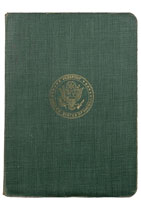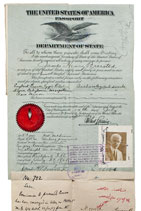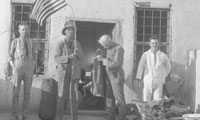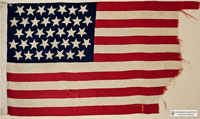Pioneers to the Past: American Archaeologists in the Middle East, 1919–20
Purchase the Exhibit Catalog.
Download the Exhibit Catalog.
Pioneers to the Past (5 minute movie)
Pioneers to the Past (Download 13 audio tour files)
Breasted's Letters Blog
Download Breasted's Letters
Breasted's 1919-1920 Expedition to the Near East
(1,875 Photographs)
“Pioneers to the Past: American Archaeologists in the Middle East, 1919-1920,” will be on display at the Oriental Institute from January 12 through August 29, 2010. The exhibit follows Illinois native James Henry Breasted's daring travels through Egypt and Mesopotamia in the unstable aftermath of World War I. Breasted, a leading Egyptologist, was the founder of the Oriental Institute at the University of Chicago, and this journey was the first Oriental Institute project. The goals of his ambitious expedition were to acquire artifacts for the new Institute and to select sites for later excavation.
Breasted's story is told by never-before-exhibited photos, artifacts, letters, and archival documents including his elaborate passport and even the wind-torn American flag that he carried on the trip. His journey placed him in the Middle East at a pivotal time when the region was occupied by British and French troops who opposed the first stirrings of nationalism that ultimately created the states of the modern Middle East. Breasted's letters refer to the luminaries of the time, many of whom he met on this trip - Faysal, king of the Arab State who later became the first king of Iraq; Gertrude Bell who founded the Iraq National Museum in Baghdad; Lord Allenby, High Commissioner of Egypt and general who recaptured Jerusalem and Damascus during the war; and T. E. Lawrence "of Arabia" whose Arab forces worked alongside Allenby. For much of the itinerary, Breasted and his four companions travelled by steamship, train, horse, cart, biplane, and Model-T Fords.
The story of the expedition is told in two voices. The first is Breasted's own, excerpted from his detailed letters. The events of the expedition are paired with the second voice - a modern commentary that considers changes in attitudes, laws, and archaeology over the past ninety years. Visitors follow the events of Breasted's travels, but at the same time they explore larger issues about the relationship of the past to the present, of archaeology and politics, and the relationship of America and the Middle East - questions that are vital to understanding America's role in the Middle East today. Exhibit Curator and Museum Director Geoff Emberling commented, "The exhibit highlights Breasted's ambition, tells a great adventure story, and makes us think about foreign involvement in the Middle East. The parallels between the First World War and today are striking."
Breasted made important purchases of antiquities during his trip. Excerpts from his letters that describe the dealers and his negotiations are juxtaposed to objects, most of which have not been exhibited for decades. The commentary explores the antiquities trade and raises the question of the importance of artifacts for national identities, for at the time of the expedition, Egyptian nationalists had began to contest foreign control of their past.
Oriental Institute Director Gil Stein added "This exhibit gives us a fascinating glimpse of a pivotal moment in history - the birth of the modern Middle East as we know it today, and at the same time, the genesis of modern archaeological research in the cradle of civilization. Its one of the best examples I know of the ways that scholarship and politics interconnect in important and unexpected ways."
The exhibit is accompanied by a fully-illustrated catalogue with essays by noted archaeologists and historians as well as a reprint of the biography of Breasted written by his son.
"Who Owns the Past," a free public forum in conjunction with Pioneers to the Past will be presented at the Oriental Institute at 2pm on Saturday, May 1, 2010. Cosponsored by the Oriental Institute and the Chicago Chapter of the Archaeological Institute of America, the forum's speakers include: James Cuno, President and Director of the Art Institute of Chicago: Geoff Emberling, Chief Curator, Oriental Institute Museum: Gil Stein, Director of the Oriental Institute and Professor of Near Eastern Archaeology, University of Chicago; and Carlos Tortelero, President of Chicago's National Museum of Mexican Art. Pre-registration required. To pre-register, call 773-702-9507 or e-mail oi-education@uchicago.edu
The Oriental Institute Museum is located at 1155 East 58th Street, Chicago. The Museum is open Tuesday, Thursday through Saturday from 10 a.m. to 6:00 p.m., Wednesday from 10:00 a.m. to 8:30 p.m., and Sunday from noon to 6:00 p.m. Suggested donation for admission is $7 for adults, $4 for children. For information, call (773) 702-9514.
This exhibit supported by:





